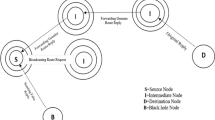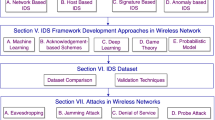Abstract
In ad hoc networks, wireless nodes rely on each other to transmit data over multi-hops by forwarding packets. A selfish node may decide not to forward packets for other nodes to save its own resource but still use the network to send and receive data. Such a selfish behavior can degrade network performance significantly. Most existing work took observation, reputation and token based mechanisms. However observation based mechanism suffers from mobility and collusion; reputation and token based mechanisms suffer from system complexity and efficiency. In this paper, we propose One More Hop (OMH) protocol which suppresses selfish behavior from a totally new angle. Basing on the fact that the selfish but rational nodes still want to receive and send packets, if a node can not determine whether a packet is destined for it or not, it can not drop the packet. With modified routing protocol and cryptographic techniques, OMH achieves this design target. It is robust and efficient. The simulation shows that OMH works well under different network situations.








Similar content being viewed by others
References
Aad I, Hubaux J-P, Knightly EW (2004) Denial of service resilience in ad hoc networks. In: MobiCom ’04: proceedings of the 10th annual international conference on mobile computing and networking, pp 202–215
Marti S, Giuli TJ, Lai K, Baker M (2000) Mitigating routing misbehavior in mobile ad hoc networks. In: MobiCom ’00: proceedings of the 6th annual international conference on mobile computing and networking, pp 255–265
Hu J, Burmester M (2006) Lars: a locally aware reputation system for mobile ad hoc networks. In: ACM-SE 44: proceedings of the 44th annual Southeast regional conference, pp 119–123
Buchegger S, Le Boudee J-Y (2005) Self-policing mobile ad hoc networks by reputation systems. Commun Mag IEEE 43(7):101–107
Buttyan L, Hubaux J-P (2001) Nuglets: a virtual currency to stimulate cooperation in self-organized ad hoc networks. Swiss Federal Institute of Technology, Tech. Rep.
Jakobsson M, Hubaux J, Buttyan L (2003) A micropayment scheme encouraging collaboration in multi-hop cellular networks. In: Proceedings of Financial Crypto 2003, Guadeloupe, 27–30 January 2003, pp 15–33
Djenouri D, Badache N (2005) New approach for selfish nodes detection in mobile ad hoc networks. Security and privacy for emerging areas in communication networks, 2005. Workshop of the 1st international conference on, 5–9 September 2005, pp 288–294
Yu B, Xiao B (2006) Detecting selective forwarding attacks in wireless sensor networks. Parallel and distributed processing symposium, 2006. IPDPS 2006. 20th international, 25–29 April 2006, 8 pp
Buchegger S, Boudec J-YL (2002) Performance analysis of the confidant protocol. In: MobiHoc ’02: proceedings of the 3rd ACM international symposium on mobile ad hoc networking & computing, pp 226–236
Jaramillo JJ, Srikant R (2007) Darwin: distributed and adaptive reputation mechanism for wireless ad-hoc networks. In: MobiCom ’07: proceedings of the 13th annual ACM international conference on mobile computing and networking, pp 87–98
Tewari H, O’Mahony D (2003) Multiparty micropayments for ad hoc networks. In: Wireless communications and networking, 2003 (WCNC, 2003), vol 3. IEEE, 16–20 March, pp 2033–2040
Zhong S, Li LE, Liu YG, Yang YR (2005) On designing incentive-compatible routing and forwarding protocols in wireless ad-hoc networks: an integrated approach using game theoretical and cryptographic techniques. In: MobiCom ’05: Proceedings of the 11th annual international conference on mobile computing and networking, pp 117–131
Huang E, Crowcroft J, Wassell I (2004) Rethinking incentives for mobile ad hoc networks. In: PINS ’04: proceedings of the ACM SIGCOMM workshop on practice and theory of incentives in networked systems, pp 191–196
Johnson D, Maltz D, Broch J (2001) DSR the dynamic source routing protocol for multihop wireless ad hoc networks. Addison-Wesley, Reading, ch. 5, pp 139–172
Zhong S, Wu F (2007) On designing collusion-resistant routing schemes for non-cooperative wireless ad hoc networks. In: MobiCom ’07: proceedings of the 13th annual ACM international conference on mobile computing and networking, pp 278–289
Wei D (2007) Crypto++ 5.5 benchmarks. http://www.cryptopp.com/bench-marks.html
Schnorr CP (1991) Efficient signature generation by smart cards. J Cryptol 4(3):161–174
Zhou L, Haas Z (1999) Securing ad hoc networks. Network IEEE 13(6):24–30
Hubaux J-P, Buttyán L, Capkun S (2001) The quest for security in mobile ad hoc networks. In: MobiHoc ’01: proceedings of the 2nd ACM international symposium on mobile ad hoc networking & computing, pp 146–155
Jiejun K, Petros Z, Luo H, Lu S, Zhang L (2001) Providing robust and ubiquitous security support for mobile ad-hoc networks. In: Network Protocols, 2001. Ninth international conference on, 11–14 November, pp 251–260
Perrig A, Szewczyk R, Tygar JD, Wen V, Culler DE (2002) Spins: security protocols for sensor networks. Wirel Netw 8(5):521–534
Author information
Authors and Affiliations
Corresponding author
Rights and permissions
About this article
Cite this article
Song, C., Zhang, Q. OMH—Suppressing Selfish Behavior in Ad hoc Networks with One More Hop. Mobile Netw Appl 14, 178–187 (2009). https://doi.org/10.1007/s11036-008-0145-2
Published:
Issue Date:
DOI: https://doi.org/10.1007/s11036-008-0145-2




